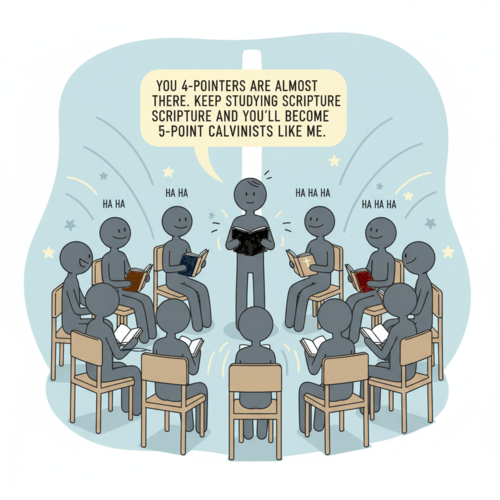4-Point Calvinism: Can I Be a Calvinist and Deny Limited Atonement?
THE SPROUL SOUNDBITE THAT WON’T LET YOU GO
“If you deny limited atonement, you’re not a 4-point Calvinist—you’re an Arminian.” RC Sproul didn’t mince words, and that statement still rattles cages in Reformed circles. Was he being provocative? Uncharitable? Or was he simply following the logic of Scripture to its inevitable conclusion?
Among the Reformed doctrines of grace, summed up in the acronym, TULIP, many believers balk at the ‘L’—Limited Atonement. They’d happily affirm Total Depravity, Unconditional Election, Irresistible Grace, and Perseverance of the Saints. They think dropping the “L” keeps them in the Reformed camp while avoiding controversy. But what if that one missing point unravels everything else? What if 4-point Calvinism is a theological impossibility?
WHAT 4-POINTERS ACTUALLY DENY
Let’s be clear about what’s at stake. Four-point Calvinists affirm God unconditionally elects specific individuals to salvation. They, however, insist Christ died equally for all people without distinction—making atonement merely available rather than effectual for the non-elect.
Here’s the problem: If Christ purchased redemption for every person without exception, yet only the elect are saved, then:
- Either Christ’s atonement failed for the non-elect (this would undermine His priestly work) OR
- God intended to save everyone but was thwarted by human will (this would collapse into Arminianism).
The real question cuts to the heart of the Gospel: Did Christ actually secure salvation for those He died for, or did He merely make salvation possible? The 5-pointer says the atonement accomplished what it intended. The 4-pointer inadvertently says it didn’t—and that’s Arminianism disguised as Reformed.
THE SCRIPTURAL CHAIN: TEXTS THAT DEMAND PARTICULAR REDEMPTION
Limited Atonement isn’t a philosophical deduction—it’s the explicit teaching of Scripture about who Christ died for and what His death accomplished.
- John 10:11, 15 – “I lay down my life for the sheep.” Not for goats, not for the world generically, but for His particular flock whom the Father gave Him. The Good Shepherd doesn’t die hoping some sheep might benefit—He dies securing their rescue.
- Ephesians 5:25 – “Christ loved the church and gave himself up for her.” The atonement has a defined object: Christ died for His bride, not humanity in abstraction. This isn’t generic love—it’s covenant love with a specific people in view.
- Matthew 1:21 – “He will save his people from their sins.” Not “make salvation possible” but “will save.” The atonement guarantees the result. Jesus doesn’t attempt rescue—He accomplishes it.
- Isaiah 53:11-12 – The Suffering Servant “shall bear their iniquities” and receives a portion “because he poured out his soul to death.” Specific substitution for specific sinners. The pronoun matters.
- Romans 8:32-34 – God “gave him up for us all” (the elect, v. 33)—and because He died for them, no charge can be brought against them. But here’s the crushing question: If Christ died for the reprobate, why do charges stand? Either His death failed, or it wasn’t for them.
These aren’t peripheral proof-texts. They’re the heartbeat of the Gospel: Christ died effectively and particularly for His own.
THE THEOLOGICAL DOMINOES: WHY DENYING LIMITED ATONEMENT TOPPLES TULIP
Sproul’s logic was airtight. Consider this syllogism:
- Premise 1: God unconditionally elects specific individuals to salvation.
- Premise 2: Christ dies to secure salvation for those individuals.
- Conclusion: If you deny Premise 2, Premise 1 collapses.
If Christ died equally and indiscriminately for all people, then election becomes a mere divine preference, not a saving decree. The Father “elects” some, but the Son doesn’t actually purchase their redemption specifically—He just makes a general provision and hopes the Spirit applies it successfully.
The result is functionally Arminian. Salvation now hinges on the will of the sinner, not the sovereign intention of the Triune God. Unconditional Election is gutted—it becomes a wish list, not a rescue operation. Irresistible Grace loses its foundation: why would the Spirit effectually apply what the Son only potentially purchased?
TULIP isn’t a buffet. Each petal supports the others. Pull out the “L,” and you’re not left with a flower—you’re left with Arminianism dressed in Reformed vocabulary. Sproul wasn’t exaggerating. He was just doing the math.
ANSWERING THE USUAL OBJECTIONS
“But doesn’t 1 John 2:2 say Christ is the propitiation ‘for the sins of the whole world’?” “World” in John’s vocabulary refers to elect from all nations, not every individual (cf. John 1:29, 3:16, 11:52). The contrast is Jew/Gentile, not elect/reprobate. And propitiation means God’s wrath is actually satisfied—if Christ propitiated for all individuals, none could be condemned.
“Doesn’t 2 Peter 2:1 say false teachers were ‘bought’ by Christ?” “Bought” can refer to covenant relationship (like Israel in the OT—externally identified with God’s people but not regenerate), not effectual redemption. It doesn’t prove universal atonement, only covenant apostasy.
“This makes evangelism dishonest—how can we offer Christ to all?” We offer Christ to all sinners indiscriminately because we don’t know who the elect are. The gospel command is universal; the atonement’s design is particular. No contradiction—just mystery and obedience.
CONCLUSION: FROM 4 POINTS TO 5 IN ONE STEP
Picture the Trinity in eternity past:
- The Father says: “I choose these from before the foundation of the world.”
- The Son says: “I will go and die for those—securing every blessing, satisfying every demand, purchasing their redemption infallibly.”
- The Holy Spirit adds: “I will apply it to them—regenerating, calling, sanctifying, preserving.”
Do you see three Persons working in perfect harmony to save a specific people? Or do you see a fractured plan where the Son dies for more than the Father chose and the Spirit saves?
The move from 4 points to 5 isn’t a theological power grab—it’s submitting to the unity of God’s saving purpose and the sufficiency of Christ’s work. Don’t settle for a half-Reformed Gospel. Embrace the fullness: Definite Atonement for a Definite People.
Christ didn’t die to make salvation possible. He died to make it certain—for His sheep, His bride, His people. That’s not limiting the atonement. That’s glorifying it.
RELATED FAQs
Would renaming “Limited Atonement” to “Particular Redemption” or “Definite Atonement” solve the problem for 4-pointers? No, because the issue isn’t terminological—it’s theological. Many Reformed theologians (including John Murray and Sinclair Ferguson) prefer “Definite Atonement” precisely because it emphasises what Christ’s death accomplished rather than what it supposedly “limited.” The name change helpfully shifts focus from extent to efficacy: Christ’s atonement isn’t limited in power but definite in design. However, 4-pointers still reject the core claim regardless of the label: that Christ died specifically and effectually for the elect alone. Better terminology can clarify the doctrine, but it can’t resolve the underlying disagreement about whether the atonement was universal in scope or particular in intention.
- What did John Owen argue in The Death of Death in the Death of Christ? Owen’s 1647 masterwork presents the most rigorous case for definite atonement in church history, built on a devastating trilemma: God intended to save (1) all people, (2) some people, or (3) no people by Christ’s death. If (1), then universalism is true (all are saved); if (3), then the Gospel has no value; therefore (2) must be true. Owen argues Christ’s priestly intercession in heaven (Hebrews 7:25) is for the same people He died for on earth—and since He doesn’t intercede for everyone, He didn’t atone for everyone. The Father’s will, the Son’s work, and the Spirit’s application are perfectly unified around a definite people.
- How did Charles Spurgeon reconcile being a Calvinist with his evangelistic zeal? Spurgeon, a staunch 5-point Calvinist, saw no tension between definite atonement and passionate evangelism—in fact, he believed particular redemption fuelled his preaching. He famously said, “I would rather believe a limited atonement that is efficacious for all men for whom it was intended, than a universal atonement that is not efficacious for anybody.” Spurgeon preached Christ freely to all sinners because he didn’t know who the elect were, but he preached with confidence because he knew Christ’s death actually secured salvation for His sheep. His evangelistic fire wasn’t dampened by Calvinism—it was ignited by the certainty that God’s sovereign grace would triumph.
What’s the difference between “sufficient for all, efficient for the elect” and true limited atonement? The medieval formulation “sufficient for all, efficient for the elect” sounds like a compromise, but it actually supports 5-point Calvinism when properly understood. The sufficiency refers to the infinite value of Christ’s sacrifice—it could have covered infinite worlds if God had so willed. The efficiency refers to God’s intentional design—Christ died to actually save the elect, not merely make salvation possible. Four-pointers often misuse this phrase to sneak in universal atonement, suggesting Christ intended to save all but only succeeded with some. But Reformed orthodoxy affirms: Christ’s death was sufficient in value for all humanity, but intended and applied specifically for the elect.
- Did any other major Reformed figures besides Sproul take such a strong stance on this issue? Yes, many did. BB Warfield called limited atonement “the heart of Calvinism” and argued denying it unravels the entire system. John Piper writes that particular redemption is “not an option” if you affirm unconditional election—the logic demands it. James White argues that 4-point Calvinism is unstable and inevitably drifts either toward full 5-point theology or away from Reformed soteriology altogether. Others like Ligon Duncan insist that while we can have fellowship with 4-pointers, the biblical evidence for definite atonement is overwhelming and the theological consistency is compelling.
- How do Amyraldians (4-point Calvinists) actually try to hold their position together? Amyraldians (named after Moise Amyraut, a 17th-century French theologian) propose a “hypothetical universalism”: Christ died for all people conditionally (if they believe), but God only grants faith to the elect. They attempt to preserve both universal atonement and unconditional election by placing a logical (not temporal) order: atonement before election. However, critics argue this distinction collapses under scrutiny—if God eternally knows who will receive faith and Christ dies knowing this, the atonement is functionally particular regardless of the hypothetical framework. The position tries to have it both ways but ends up satisfying neither Calvinists nor Arminians fully.
What about 1 Timothy 2:4-6 and 2 Peter 3:9, which say God desires “all people” to be saved? These texts trouble many 4-pointers who think they demand universal atonement, but they’re entirely consistent with 5-point Calvinism when read carefully. In 1 Timothy 2:4, “all people” refers to all kinds of people (the context is praying for kings and authorities—breaking ethnic/social barriers), not every individual exhaustively. In 2 Peter 3:9, “all” refers to the elect (“you” in context)—God is patient, not willing that any of His chosen ones should perish. Scripture uses “all” and “world” with different scopes depending on context (cf. Luke 2:1, John 12:19). Universal language in Scripture often means “without ethnic distinction” rather than “without individual exception,” which perfectly supports particular redemption.
OUR RELATED POSTS
Editor's Pick

GPS Without Eyes: How Ants Silently Shout Intelligent Design
Picture a leafcutter ant navigating the rainforest floor in pitch darkness, carrying a leaf fragment 50 times its body weight. [...]

Born Broken: Why Must We Affirm Original Sin?
Imagine a world where we’re born neutral—free to choose good, and without a bias toward evil. Sounds appealing… until we [...]

Does God Truly Care About My Everyday Choices?
OWe believe God created the universe. We believe He orchestrated the exodus from Egypt and raised Jesus from the dead. [...]
SUPPORT US:
Feel the Holy Spirit's gentle nudge to partner with us?
Donate Online:
Account Name: TRUTHS TO DIE FOR FOUNDATION
Account Number: 10243565459
Bank IFSC: IDFB0043391
Bank Name: IDFC FIRST BANK






